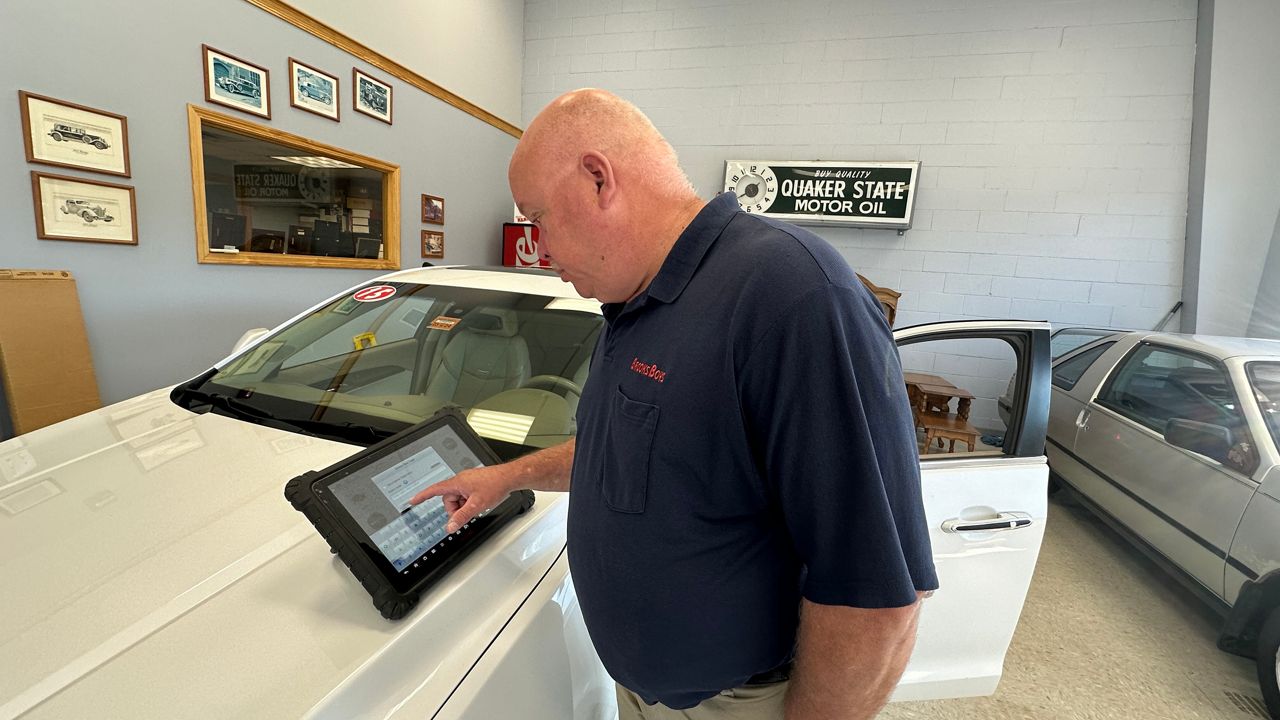The way Dan Brooks sees it, small auto repair shops in Maine will struggle to fix new cars in the future — particularly as the push toward electric vehicles accelerates.
That’s why he’s supporting Question 4 on the Nov. 7 ballot, the so-called “right to repair” initiative that would require vehicle manufacturers to standardize diagnostic systems and share that information with repair shops.
The idea is to ensure that vehicles can be fixed outside of dealerships if a consumer wants to make that choice.
“If you buy a car, you shouldn’t be restricted on where you get your car fixed,” said Brooks, owner of Capitol Car Care in Augusta.
But a group representing most vehicle manufacturers says small repair shops already have the information they need to make repairs. They think the groups behind Question 4 are after customer data because they want to market directly to consumers — even going as far as advertising on the screen inside your car.
“We’ve said from the beginning the information they are talking about is not necessary to complete a repair,” said Wayne Weikel, vice president of state affairs for the Alliance for Automotive Innovation.
Voters in November will be left to decide whether existing agreements about information needed to make repairs are enough to help independent repair shops in the future.
It’s one of four citizen initiatives and four constitutional amendments on the ballot.
Campaign finance reports show the Maine Automotive Right to Repair Committee has received nearly $4.4 million to push for passage of the ballot question.
Of that, $1.3 million comes from the Coalition for Automotive Repair Equality, which works in state legislatures and Congress to advance the interests of automotive aftermarket companies such as NAPA, AutoZone, Advance Auto Parts and O’Reilly Auto Parts.
On the other side, Weikel’s group — which represents manufacturers who produce most of the vehicles sold in the U.S., including GM, Ford and Toyota — has contributed just $110,000 in opposition.
Weikel argues that Question 4, which follows a similar push in Massachusetts, is unnecessary because automakers have entered into four separate agreements in which they pledge to provide shops with the information they need to make repairs.
That includes a new agreement signed this summer by the alliance and the Automotive Service Association and the Society of Collision Repair Specialists.
The agreement states that automakers “shall” make available for purchase the “same diagnostic and repair information” that’s made available to dealers. That includes information about electric and hybrid vehicles.
In addition, the automakers agreed to provide “specific telematic diagnostic and repair data” when it’s needed to fix a vehicle. Telematics refers to information transmitted from a vehicle to the manufacturer and information sent from the manufacturer to the vehicle.
“It closes the loophole if it’s needed for a repair,” Weikel said. “We have closed that loophole four times now.”
Brooks says those agreement are fine, but that if one party is not living up to its obligations, he has nowhere to turn.
“There really is no way to enforce it,” he said.
Just this summer, Brooks spent weeks trying to get access to the computer technology needed to fix a vehicle. He was told the program worked fine for dealerships, but for shops like his, the technology was “broken.”
Eventually, a subcontractor who specializes in helping with vehicle computer programming bought a new $2,000 adapter so he could get access to the technology.
“If their dealerships were down, that wouldn’t have lasted a month,” Brooks said. “So it has affected us in the past and I think it’s only going to get worse.”
That’s because electric vehicles don’t have the same types of ports near the steering wheel that allows shops like Brooks’ to hook up and diagnose problems.
The vote in Maine follows a years-long legal battle in Massachusetts that began when voters there overwhelmingly supported a right to repair initiative in 2020.
After a lot of back and forth, the National Highway Traffic Safety Administration in August came out in support of the Massachusetts approach to “right to repair.”
Initially, the federal government had expressed concerns about the security of providing remote access to vehicle data, fearing cybersecurity risks. But it came on board with the idea once it learned that the data could be sent from close range via Bluetooth.
“Limiting the geographical range of access would significantly reduce the risk that malicious actors could exploit vulnerabilities at scale to access multiple vehicles, including, importantly, when vehicles are driven on a roadway,” wrote NTSB’s Kerry Kolodziej, assistant chief counsel.
The prospect of a cybersecurity risk is also one emphasized by the automakers who say the current telematic system provides “one, hardened connection to the outside world.”
“Criminals could exploit each of these digital connections between the vehicle and the independent repair shop to not only access the vehicle’s data but to hack into the vehicle or embed malicious code,” the automotive alliance writes in a memo about the ballot question.
Brooks said he has no interest in gaining access to driver data. He just wants assurances that he and other independent repair shops can stay in business now and in the future.
“I personally want to make sure that I can get into people’s vehicles and service them or really, quite honestly, my business goes away,” he said.



